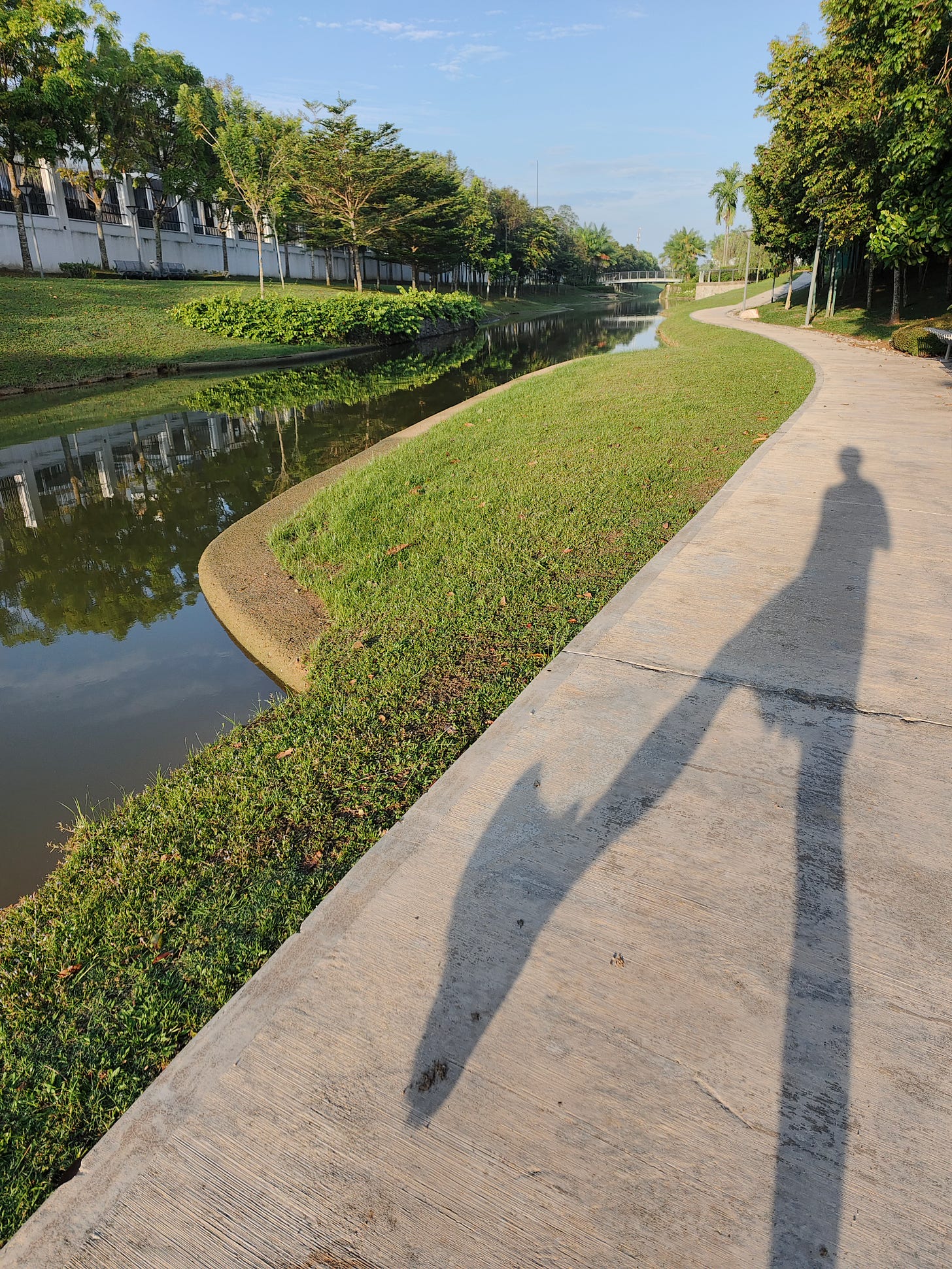Many people set New Year's resolutions, but less than 8% fulfilled their goals by the end of the year (according to a study conducted by the University of Scranton). Sometimes, I, too, lose motivation if a practice is inconvenient or uncomfortable. I miss the necessary rhythm for such practice to become a habit and eventually miss the goal.
To put the discussion into context. Examples of consistent actions for H2W2 (health, happiness, wealth, wisdom) goals are:
save money by avoiding non-essential and wasteful wishful expenditures
eat whole food and less ultra-processed food
increase movement with activities and exercise
proactively maintaining good relationships (e.g. visit your parents or good friends periodically and frequently)
do activities that make you happy (that do no harm to others)
read more books or learn 60 minutes from any sources
work on your personal project every week etc.
Almost everyone has tried the above positive actions, but few have consistently embraced them as lifestyle habits. Water cannot compete with the hardness of solid rocks, but persistent dripping droplets can make a hole through the rock and even carve out an underground river.
[image credit Bing Image Creator] 滴水穿石
I am reflecting on my behaviors, as not every desired action can maintain consistency. Why do we fail to take long-term, consistent actions?
consistent actions are boring and not exciting, like a big win or quick fix. Most of us only have the awareness and jump into action using willpower without building a strong desire (‘why’), which is the fuel to endure long-term execution.
{PROSCI change management ADKAR framework, Awareness > Desire > Knowledge > Ability > Reinforcement}
have clarity of the trade-offs and what pain and problem you are willing to have (to trade with the goal you want). Set the boundary for the upcoming sacrifices and efforts you are willing to take. Anything within the boundary cannot be an excuse.
distractions in life make us not feel like taking action on a stressful or inconvenient day.
aiming for perfection, which is hard to maintain.
We prefer instant gratification, but the long game takes time [OLO Systems Thinking]. We cannot feel the positive outcome that can only be attained with time in the distant future. We also do not get instant negative feedback for our bad habits.
Eating snacks is satisfying now, but we cannot see a fit body immediately if I eat whole food today (it probably takes weeks to see a slight improvement).
Quitting too soon is common, and most of us prefer the magic pill that can instantly make us feel better (soothing the symptom is favorable as we have no patience to fix the root cause)
lack of a clear identity
Our perceived identities shape our behaviors. If we see ourselves as Olympian athletes, we are likely to exercise routinely, consistently maintain a healthy diet, sleep well, and manage our stress.
Having an identity (self-image) of ‘an addict trying to quit smoking’ has a very different mindset from an identity as a ‘non-smoker’.
we do not honestly believe that the actions will work. If we have faith, we will commit to the activities despite being unable to see the immediate result. We have the conviction that something is working under the surface.
We are doing it for someone else, we don’t own the accountability. We are aware that it is good to exercise, but we do not internalize what it means to be healthy if that is truly what we want (or wish of someone else). Do we want to study hard for 10+ years to become a medical doctor, or it is my parent’’ bucket list or personal unfulfilled dream?
Procrastination is a way our brain tries to protect us from the pain of failing. If we don’t do it, we won’t fail at it.
The benefits of being consistent:
The compound effect is the key to success
habitual routines take less conscious effort (‘effortless’), and are more sustainable in honing the personal mastery skills
personal brand and reputation, you are known to be a trustworthy person if you are consistent with your virtues and standards
"I fear not the man who has practiced 10,000 kicks once, but I fear the man who has practiced one kick 10,000 times." - Bruce Lee
Perhaps we can draw learning tips from running marathons, consistently
focus on the next lamp post and run toward it, and set the next target lamp post.
Maintaining at zone 2 heart rate and pacing yourself. There is no need to rush.
having a clear WHY you are running, as the mindset will carry you for the last 10KM.
Sustainable Actions
How can we stick to long-term, consistent actions?
plan with pre-allocated time in our schedule, removing distractions, optimizing convenience, and allocating break time to anticipate setbacks and disruptions.
For example, if you go to the gym on Tuesday and Thursday evenings, schedule on-site meetings near your gym in the afternoon.
e.g. plan your week ahead on Sunday, plan for tomorrow, tonight
Set the intention for tomorrow in the evening or before going to bed. When it comes to a new day, follow mostly prescheduled activities (this can reduce the friction of having to decide what to do)
design the environment with fewer frictions and resistance. Use cues and triggers that encourage us to execute the action.
Use reminders that evoke positive emotions (the benefits you get or the pain you could reduce), which motivate us.
Use peer pressure and social power, carry out the activities with friends, or have someone who encourages you or holds you accountable
start with simple and easy action, make the tiny routine a habit (ritual), progress, and then spiral up with iterations to the more complex action sequence. This resembles how babies learn to stand, walk, and run. Starting with baby steps. If we plan to cultivate the habit of exercising, examples of iteration of tiny steps can be:
place the shoe and exercise outfit the night before
wearing exercise shoes in the morning, making 3 steps outdoor
showing up in the gym or park (you already win by doing this, so it is totally okay to go home immediately)
do a 1-minute exercise
gradually extending the time and activities, and so on
Another example of simplifying is avoiding checklists or items more than a handful (five) and being flexible. For instance, many of us are ‘poisoned’ by the personal improvement influencers to have morning routines like the billionaires, and we must do this and that, or else we are a ‘loser’. When the mandate ‘must-do list’ for daily morning routine becomes a burden to be accomplished, we are setting ourselves up for disappointment. An alternative way is to look at the core pillars (like health, happiness, wealth, and wisdom), and develop a flexible morning routine as long as there are elements that nourish your mind, body, and soul. This will change from the 10 must-do activities to 3 or 4 types of activities, and you can swap to various activities on a different day. Flexibility is the key to being sustainable.
mind: reading, journaling, listening to podcasts etc.
body: any form of exercise, like Tabata, jogging, yoga, pilates, Tai Chi Chuan etc.
soul: meditation, mindfulness, and spiritual practices
Create the routine before your important ‘game’ (e.g. presentation, competition). Do the same routine as a ritual. Such a routine sets our mind and body into the same practice drill we have been training for consistent peak performance.
Be an essentialist, say NO to many ‘goods’, and focus your effort on one GREAT thing, doing less but better.
Focus on the process, not the result. This is where working the system is better than goal setting. Our ‘win’ is carrying out the system process. Celebrate the process wins (don’t wait to celebrate if and only if you achieve the end goal; it is depressing as there is a 50% chance that won’t happen, but you can 100% win on the baby steps). Make the process fun and enjoyable, and celebrate little signs of progress.
Don’t beat yourself up for failing to take consistent actions, just back to the drawing board to re-design a new set of baby steps but sure steps, and start the new approach again with lesser resistance and more process wins (not end goal win). Avoid relying on willpower. It is more reliable to use a system.
Reset an empowering identity and strengthen the accountability to own the goal. Associate the goal with our core values. Be the system designer (a leader is the ship's designer, not the captain).
If we break the streak of rhythm, we should recover and resume. We should keep going with consistent activities and regain momentum. Blame and shame do not help.
[Image Credit Bing Image Creator]
“When you look at people who are successful, you will find that they aren’t the people who are motivated, but have consistency in their motivation.” – Arsene Wenger
Personal Experiments
If I want to wake up consistently at the same time and feel refreshed, I shall not set the alarm. I notice that setting the alarm program creates a ‘reminder’ in my subconscious mind to be mindful of the alarm, deteriorating my sleep quality. I do not put an alarm clock unless I have a 4 am flight.
Using the 80/20 rules to set room for flexibility works well with my practice. Meaning that I pre-allocate 20% of the distractions or disturbances that screws up my plan or have a variety to keep my interest going. This works better than a 100% rigid plan to maintain long-term consistent action.
Upon reflection, I did act on the few examples I set forth as examples at the beginning of this article:
I went back to my hometown to visit my parents
I visited a few new cafes and restaurants and one expo and watched a few movies and dramas (including “Kill Bok-Soon”, a Korean Netflix movie likes merging “Kill Bill” with “John Wick”)
I have almost finished reading the book “Essentialism by Greg McKeown) this weekend
So far, the hardest routine is my weekly morning exercises. The morning at 7:30 a.m. (to catch the morning light) is the most vulnerable activity, as weather or a morning meeting at the client site may disturb the plan. I am still experimenting with how to improve consistency by designing a more flexible structure for the system.
Writing this weekly public journal is also a practice of consistent ‘creation’, a way to force me to express myself constantly. I could choose to make excuses like no time or give up in fear of judgment, or I could choose to ‘just do it’ consistently for 10 years and see what I can learn from this.
I am what I do every day.
Share your practice in the comment section, which could help me and benefit other readers.




